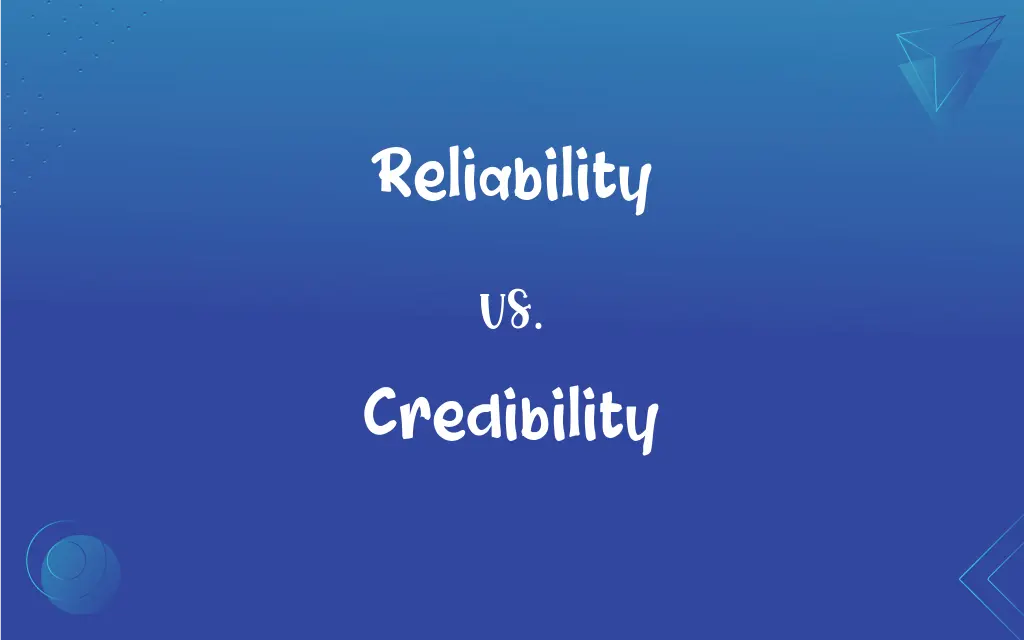Reliability vs. Credibility: What's the Difference?
Edited by Harlon Moss || By Janet White || Published on December 3, 2023
Reliability refers to consistency and dependability in performance or behavior. Credibility refers to the quality of being believable or trustworthy.

Key Differences
Reliability refers to the consistency and dependability of something, often assessed over time. Credibility pertains to the believability and trustworthiness of a source or information, influenced by perceived expertise and objectivity.
In the context of information, reliability is judged by the consistency of the data or content. Credibility, on the other hand, is evaluated based on the source's qualifications, reputation, and the evidence supporting the information.
Reliability implies a repeated ability to perform or deliver results consistently. Credibility implies a degree of trust in the information or person, based on past accuracy and integrity.
A reliable source consistently provides accurate information over time, while a credible source is one whose information is believable and trustworthy at any given moment.
Reliability is often quantifiable, such as in the reliability of a machine or system. Credibility, more subjective, depends on perception and the context of the information or individual.
ADVERTISEMENT
Comparison Chart
Definition
Consistency in performance or behavior
Believability or trustworthiness
Measurement
Assessed over time
Assessed per instance or context
Focus
Dependability, predictability
Trust, believability
Context
Often applied to systems or information
Primarily associated with sources or people
Quantification
More quantifiable
More subjective
ADVERTISEMENT
Reliability and Credibility Definitions
Reliability
Reliability refers to the ability to be consistently good in quality or performance.
The car's reliability has made it a favorite among consumers.
Credibility
Credibility is the quality of being trusted and believed in.
The journalist's credibility was built on years of accurate reporting.
Reliability
Reliability is the degree to which something provides the same result on repeated trials.
The experiment's reliability was confirmed by consistent results over multiple tests.
Credibility
Credibility also relates to the capacity to influence based on trustworthiness.
The company's credibility in the market was crucial for its success.
Reliability
In statistics, reliability is the extent to which an instrument gives consistent measurements.
The scale's reliability was essential for accurate scientific measurements.
Credibility
Credibility involves being convincing or believable.
His argument lacked credibility due to insufficient evidence.
Reliability
Reliability can mean dependability in someone or something.
Her reliability as a team member earned her a leadership role.
Credibility
In a legal context, credibility refers to the trustworthiness of a witness or testimony.
The witness's credibility was key in the trial's outcome.
Reliability
Reliability also refers to the likelihood of something functioning well over time.
The software's reliability is critical for our long-term project success.
Credibility
Credibility can mean the quality of being believable or worthy of trust.
The scientist's credibility in the community enhanced the acceptance of her findings.
Reliability
Capable of being relied on; dependable
A reliable assistant.
A reliable car.
Credibility
The quality, capability, or power to elicit belief
"The scandals posed a crisis of credibility for collegiate athletics" (Taylor Branch).
Reliability
Yielding the same or compatible results in different clinical experiments or statistical trials.
Credibility
A capacity for belief
A story that strained our credibility.
Reliability
The quality of being reliable, dependable, or trustworthy.
Credibility
Reputation impacting one's ability to be believed.
After weeks of blowing smoke, her credibility with me was next to nil.
Reliability
(education) the ability to measure the same thing consistently (of a measurement indicating the degree to which the measure is consistent); that is, repeated measurements would give the same result (See also validity).
Credibility
(legal) Believability of statements by a witness, as measured by whether the testimony is probable or improbable when judged by common experience.
Reliability
(engineering) measurable time of work before failure
Credibility
The quality of being credible; credibleness; as, the credibility of facts; the credibility of witnesses.
Reliability
The state or quality of being reliable; reliableness.
Credibility
The quality of being believable or trustworthy
Reliability
The trait of being dependable or reliable
FAQs
Is credibility subjective?
Yes, credibility can be subjective as it depends on perception and trust in the source.
Can reliability be measured?
Yes, reliability is often measurable, especially in the context of machines or systems.
How do reliability and credibility differ?
Reliability focuses on consistent performance, while credibility is about trustworthiness and believability.
Can a source be reliable but not credible?
Yes, a source might consistently provide information (reliable) but lack trustworthiness (not credible).
How does experience affect credibility?
Greater experience can enhance credibility if it contributes to a history of trustworthiness and expertise.
Can a reliable process still produce errors?
Yes, even reliable processes can occasionally produce errors, though the likelihood is typically lower.
What makes a person credible?
A person's expertise, past accuracy, integrity, and reputation contribute to their credibility.
Can credibility change over time?
Yes, credibility can change based on new information or changes in perception.
Is credibility important in journalism?
Absolutely, credibility is crucial in journalism for maintaining trust and influence with the audience.
Can public opinion influence credibility?
Public opinion can influence the perception of credibility, though it may not always reflect actual trustworthiness.
How do credentials affect credibility?
Credentials can bolster credibility by providing evidence of expertise or qualifications.
Why is reliability important in products?
Product reliability is important for customer satisfaction, safety, and brand reputation.
Can a credible source become unreliable?
Yes, if a credible source starts providing inconsistent information, it can become unreliable.
Why is reliability important in research?
In research, reliability ensures that results are consistent and replicable, adding validity to the findings.
What role does evidence play in credibility?
Strong evidence enhances credibility by supporting claims and demonstrating trustworthiness.
Is reliability a static attribute?
Reliability is not necessarily static; it can change based on circumstances and over time.
How does consistency relate to reliability?
Consistency is a key component of reliability; consistent performance over time indicates reliability.
Can personal bias affect credibility?
Personal bias can affect the perception of credibility, either positively or negatively.
Does a lack of reliability affect credibility?
Yes, a lack of reliability can diminish credibility, as consistent performance is often a basis for trust.
Can technology be reliable?
Yes, technology can be reliable if it consistently functions as intended over time.
About Author
Written by
Janet WhiteJanet White has been an esteemed writer and blogger for Difference Wiki. Holding a Master's degree in Science and Medical Journalism from the prestigious Boston University, she has consistently demonstrated her expertise and passion for her field. When she's not immersed in her work, Janet relishes her time exercising, delving into a good book, and cherishing moments with friends and family.
Edited by
Harlon MossHarlon is a seasoned quality moderator and accomplished content writer for Difference Wiki. An alumnus of the prestigious University of California, he earned his degree in Computer Science. Leveraging his academic background, Harlon brings a meticulous and informed perspective to his work, ensuring content accuracy and excellence.







































































